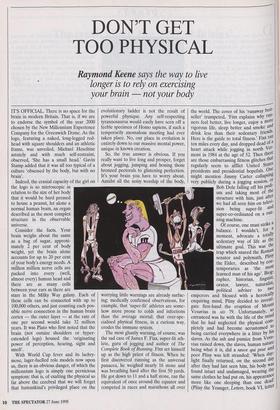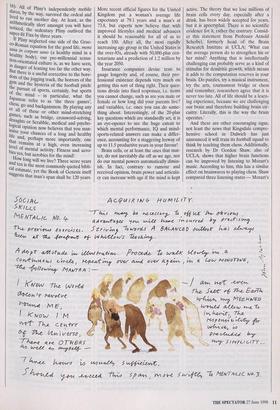DON'T GET TOO PHYSICAL
Raymond Keene says the way to live
longer is to rely on exercising your brain — not your body
IT'S OFFICIAL. There is no space for the brain in modern Britain. That is, if we are to endorse the symbol of the year 2000 chosen by the New Millennium Experience Company for the Greenwich Dome. As the logo, featuring a naked, long-legged red- head with square shoulders and an athletic frame, was unveiled, Michael Heseltine astutely and with much self-restraint, observed, 'She has a small head.' Gavin Stamp added that it was all too typical of a culture 'obsessed by the body, but with no brain'.
Indeed, the cranial capacity of the girl on the logo is so microscopic in relation to the size of her body that it would be hard pressed to house a peanut, let alone a normal human brain, an organ described as the most complex structure in the observable universe.
With World Cup fever and its lachry- mose, lager-fuelled role models now upon us, there is an obvious danger, of which the millennium logo is simply one pernicious symptom: that is, of exalting the physical so far above the cerebral that we will forget that humankind's privileged place on the evolutionary ladder is not the result of powerful physique. Any self-respecting tyrannosaurus would easily have seen off a feeble specimen of Homo sapiens, if such a temporarily anomalous meeting had ever taken place. No, our place in evolution is entirely down to our massive mental power, unique in known creation.
So, the true answer is obvious. If you really want to live long and prosper, forget about jogging, jumping and honing those bronzed pectorals to glistening perfection. It's your brain you have to worry about. Amidst all the noisy worship of the body, worrying little warnings are already surfac- ing: medically confirmed observations, for example, that 'super-fit' athletes are some- how more prone to colds and infections than the average mortal; that over-spe- cialised physical fitness, in a curious way, erodes the immune system.
The most ghastly warning, of course, was the sad case of James F. Fixx, super-fit ath- lete, guru of jogging and author of The Complete Book of Running. Fixx set himself up as the high priest of fitness. When he first discovered running as the universal panacea, he weighed nearly 16 stone and was breathing hard after the first 50 yards. He got down to 11 and a half stone, ran the equivalent of once around the equator and competed in races and marathons all over the world. The cover of his 'runaway best- seller' trumpeted, 'Fixx explains why run" ners feel better, live longer, enjoy a more, vigorous life, sleep better and smoke and drink less than their sedentary friends. Here is the guide to total fitness.' Fixx tan ten miles every day, and dropped dead of heart attack while jogging in north Ver." mont in 1984 at the age of 52. Then there are those embarrassing fitness glitches that regularly seem to afflict United States presidents and presidential hopefuls. One might mention Jimmy Carter collapsing very publicly during a jogging session, 01 Bob Dole falling off his poi" urn and taking most of the structure with him, just after we had all seen him on televi- sion being super-fit and super-co-ordinated on a run" ning machine. Of course, one must strike a balance. I wouldn't, for a moment, advocate a totally sedentary way of life as the ultimate goal. This was the trap which snared the Roman senator and polymath, Pliny the Elder, described by con" temporaries as 'the most learned man of his age'. Biog- rapher, historian, linguist, orator, lawyer, naturalist, political adviser to tw° emperors and blessed with a heroically enquiring mind, Pliny decided to investi- gate first-hand the eruption of Mount Vesuvius in AD 79. Unfortunately, s°, entranced was he with the life of the mind that he had neglected the physical com- pletely and had become accustomed t° being carried everywhere in a litter by his slaves. As the ash and pumice from Vesu- vius rained down, the slaves, human nature being what it is, did a sauve qui peat and poor Pliny was left stranded: 'When day' light finally returned, on the second daY after they had last seen him, his body was found intact and undamaged, wearing the same clothes he had put on, his appearance more like one sleeping than one dead' (Pliny the Younger, Letters, book VI, letter 16). All of Pliny's independently mobile slaves, by the way, survived the ordeal and lived to run another day. At least, as the arithmetically alert amongst you will have noticed, the sedentary Pliny outlived the super-fit Fin by three years. If Pliny neglected one side of the Grae- co-Roman equation for the good life, mens sana cotpore sano (a healthy mind in a healthy body), our pre-millennial sensa- tion-orientated culture is, as we have seen, in danger of leaning too far the other way. But there is a useful corrective to the bore- dom of the jogging track, the horrors of the gym and the hysteria of the football pitch: the pursuit of sports, certainly, but sports of the mind – in particular, what the Japanese refer to as 'the three games', chess, go and backgammon. By playing any or all of these or other mind-stretching games, such as bridge, crossword-solving, draughts or Scrabble, medical and psycho- logical opinion now believes that you max- imise your chances of a long and healthy life and, perhaps more importantly, one that remains at a high, even increasing level of mental activity. Fitness and aero- bics yes, but aerobics for the mind! How long will we live? Three score years and ten is the most commonly quoted bibli- cal estimate, yet the Book of Genesis itself suggests that man's span shall be 120 years. More recent official figures for the United Kingdom put a woman's average life expectancy at 79.1 years and a man's at 73.8, but experts now believe that with improved lifestyles and medical advances it should be reasonable for all of us to reach 100. After all, the most rapidly increasing age group in the United States is the over-85s, already with 50,000-plus cen- tenarians and a prediction of 1.2 million by the year 2050.
Insurance companies devise tests to gauge longevity and, of course, their pro- fessional existence depends very much on getting this sort of thing right. Their ques- tions divide into fixed responses, i.e. items you cannot change, such as are you male or female or how long did your parents live? and variables, i.e. ones you can do some- thing about. Interestingly, of the 20-plus key questions which are standardly set, it is an eye-opener to see the huge extent to which mental performance, IQ and mind- sports-related answers can make a differ- ence, accounting for a staggering leeway of up to 11.5 productive years in your favour!
Brain cells, or at least the ones that mat- ter, do not inevitably die off as we age, nor do our mental powers automatically dimin- ish. In fact, contrary to rumour and received opinion, brain power and articula- cy can increase with age if the mind is kept active. The theory that we lose millions of brain cells every day, especially after a drink, has been widely accepted for years, but it is apocryphal. There is no scientific evidence for it, rather the contrary. Consid- er this statement from Professor Arnold Scheibel, formerly head of the Brain Research Institute at UCLA: 'What can the average person do to strengthen his or her mind? Anything that is intellectually challenging can probably serve as a kind of stimulus for dendritic growth, which means it adds to the computation reserves in your brain. Do puzzles, try a musical instrument, try the arts, tournament bridge or chess and remember, researchers agree that it is never too late. All of life should be a learn- ing experience, because we are challenging our brain and therefore building brain cir- cuitry. Literally, this is the way the brain operates.' And there are other encouraging signs, not least the news that Kingsdale compre- hensive school in Dulwich has just announced it will train its football squad to think by teaching them chess. Additionally, research by Dr Gordon Shaw, also of UCLA, shows that higher brain functions can be improved by listening to Mozart's music. According to him, this has a similar effect on brainwaves to playing chess. Shaw compared three listening states — Mozart's



























































 Previous page
Previous page